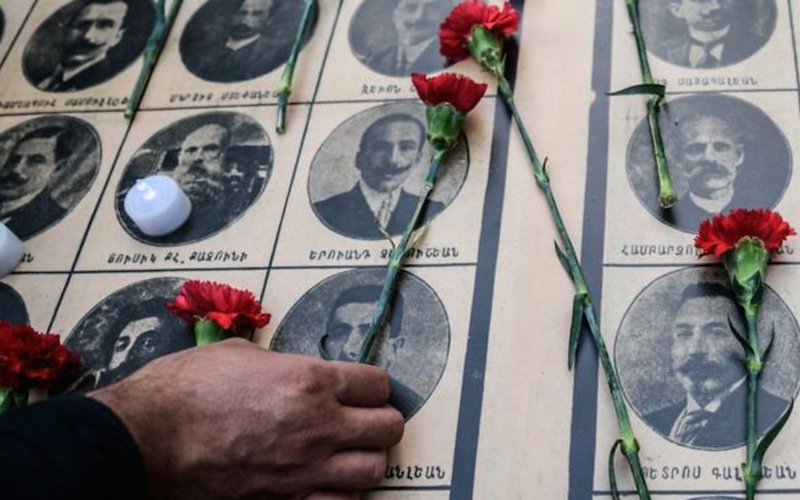
The Crime of Genocide Denial?
France has long been a champion of the Armenian cause, and to many its recent criminalization of Armenian genocide denial represents a positive step in the direction of treating the great crime with the solemnity it deserves. In reality, however, attempts to silence denial are entirely counterproductive in the pursuit of global recognition. If the Armenian genocide is to be acknowledged by the international community, its legitimacy has to be affirmed by the merits of its historical claims, not by the censoring of its political opposition.
Following Germany’s recognition of the genocide, France’s criminalization of denial occurs within the context of Europe’s escalating frustration with the humanitarian consequences of Turkish authoritarianism, and Ankara’s ongoing attempts to undermine the stability of the European Union through its threats to dismantle the tenuous refugee deal. Recognizing the symbolic significance of the Armenian genocide in Turkish political debate, France and Germany have sought to use the issue as a vehicle to mobilize international pressure against the Turkish government to diminish its political capital.
However, while France understands the symbolic challenge the Armenian genocide represents to the legitimacy of Ankara’s narrative of power, it has underestimated Turkey’s capacity to mobilize its population against exogenous threats to the credibility of the government’s moral authority. For Turkey, genocide denial established a precedent by which the government could reinforce its exercise of authority through the extensive coordination of social forces.
Through its monopolization over the legitimate interpretation of Turkish history and culture, the institutionalization of denial has afforded Ankara undue influence over the shaping of public debate and the role of civil society. This state ownership of national identity has facilitated the engendering of a chauvinistic mistrust of non-Turkish communities, enabling authorities to justify the increasing centralization of power as a means of protecting the population from numerous threats both external and internal.
As a result, the use of the Armenian genocide to score symbolic political points against Ankara, while effective in the short term as a means of infuriation, will necessarily fail to produce positive political outcomes. Ultimately, these external efforts to enact change only justify Turkey’s institutionalized suspicion of foreign actors, reinforcing the nationalist sentiments which both undermine the plight of the Armenian people and provoke discord with Europe.
Additionally, efforts to criminalize genocide denial reveal contradictions which betray the credibility of both the moral and historical authority of the Armenian position. First, there is the concern surrounding the use of censorship as a means of condemning another state’s use of censorship. And secondly, it raises the question that if we’re so sure the Armenian genocide happened, why do we feel the need to silence denial?
A legitimate counter-argument contends that as denial is the final stage of genocide, preventing its perpetuation is the only means by which we can hope to restore the cultural and social memory of dispossessed peoples. When Raphael Lemkin coined the term ‘genocide,’ he sought to define a phenomena which incorporated more than just the physical annihilation of a people; but the process of their social, cultural, political, and religious destruction.
Denial has allowed Turkey (and by extension Azerbaijan) to perpetuate this process of genocide through the continued expropriation of Armenian cultural and religious property, the attempts to erase the official history of the Armenian people, the restriction of access to political and legal institutions, and the social pressures of cultural and religious assimilation. Supporters of France’s decision regard the criminalization of genocide as the establishment of a precedent which rebukes this ongoing process of cultural dispossession.
In practice, however, the criminalization of genocide denial functions as a form of blame avoidance for France. In acting on behalf of Armenia to make a political statement against Turkey’s actions, France, whether consciously or not, makes Armenia morally responsible for its position.
Ultimately, it is Armenia, not France, that suffers the most from the fallout of these political decisions. For Turkey, Armenia’s perceived instigation of this international condemnation reinforces the suspicion of a conspiratorial enterprise of minority communities seeking to undermine the Turkish state; fueling hostility and facilitating the further dispossession of not only the Armenian people, but any political community which rejects Ankara’s claims.
In addition to justifying Ankara’s paranoia, the criminalization of denial perpetuates the distancing of Armenian and Turkish political communities. By preventing public discourse, both sides fail to critically engage with historical issues and myths begin to trump reality. If reconciliation is an ultimate goal, criminalization represents an obstacle because it only reinforces the often misinformed and divisive patriotic narratives which dominate public debate.
Ultimately, the criminalization of genocide may be revealed as a pyrrhic victory for Armenia, the diaspora, and its supporters. In the short term, France has taken a symbolic stand against an authoritarian regime’s past and present humanitarian transgressions, and a step towards justice for the Armenian people. In the long term, however, it has reinforced the suspicions of the Turkish people which have facilitated the government’s ongoing centralization of power, encouraged the destabilization of Europe, and justified the continued political isolation of Armenia.

